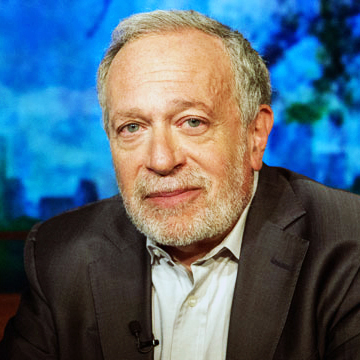This post first appeared at Robert Reich blog.

President Barack Obama waves as he departs after delivering remarks on the economy at the Uptown Theater in Kansas City, Missouri, July 30, 2014. (Photo: Official White House Photo by Pete Souza/flickr US Government)
On Friday, President Obama chose Nike headquarters in Oregon to deliver a defense of his proposed Trans-Pacific Partnership.
It was an odd choice of venue.
Nike isn’t the solution to the problem of stagnant wages in America. Nike is the problem.
It’s true that over the past two years Nike has added 2,000 good-paying professional jobs at its Oregon headquarters, fulfilling the requirements of a controversial tax break it wrangled from the state legislature. That’s good for Nike’s new design, research and marketing employees.
Just before the president spoke, Nike announced that if the Trans Pacific Partnership is enacted, Nike would “accelerate development of new advanced manufacturing methods and a domestic supply chain to support US based manufacturing,” thereby creating as many as 10,000 more American jobs.
But that would still be only a tiny fraction of Nike’s global workforce. While Nike makes some shoe components in the United States, it hasn’t assembled shoes here since 1984.
Americans made only 1 percent of the value of Nike products that generated Nike’s $27.8 billion revenue last year. And Nike is moving ever more of its production abroad. Last year, a third of Nike’s remaining 13,922 American production workers were laid off.
Most of Nike’s products are made by 990,000 workers in low-wage countries whose abysmal working conditions have made Nike a symbol of global sweatshop labor.
As wages have risen in China, Nike has switched most of its production to Vietnam where wages are less than 60 cents per hour. Almost 340,000 workers cut and assemble Nike products there.
In other words, Nike is a global corporation with no particular loyalty or connection to the United States. Its loyalty is to its global shareholders.
I’m not faulting Nike. Nike is only playing by the rules.
I’m faulting the rules.
In case you hadn’t noticed, America has a huge and growing problem of inequality. Most Americans are earning no more than the typical American earned 30 years ago, adjusted for inflation – even though the US economy is almost twice as large as it was then.
Since then, almost all the economic gains have gone to the top.
The president is angry at Democrats who won’t support this trade deal.
He should be angry at Republicans who haven’t supported American workers. Their obduracy has worsened the potential impact of the deal.
Congressional Republicans have refused to raise the minimum wage (whose inflation-adjusted value is now almost 25 percent lower than it was in 1968), expand unemployment benefits, invest in job training, enlarge the Earned Income Tax Credit, improve the nation’s infrastructure or expand access to public higher education.
They’ve embraced budget austerity that has slowed job and wage growth. And they’ve continued to push “trickle-down” economics – keeping tax rates low for America’s richest, protecting their tax loopholes and fighting off any attempt to raise taxes on wealthy inheritances to their level before 2000.
Now they – and the president – want a huge trade agreement that protects corporate investors but will lead to even more off-shoring of low-skilled American jobs.
The Trans Pacific Trade Partnership’s investor protections will make it safer for firms to relocate abroad – the Cato Institute describes such protections as “lowering the risk premium” on offshoring – thereby reducing corporate incentives to keep jobs in America and upgrade the skills of Americans.
Those same investor protections will allow global corporations to sue the United States or any other country that raises its health, safety, environmental or labor standards, for any lost profits due to those standards.
But there’s nothing in the deal to protect the incomes of Americans.
We know that when Americans displaced from manufacturing jobs join the glut of Americans competing for jobs that can’t be replaced by lower-wage workers abroad – personal service jobs in retail, restaurant, hotel, hospital, child care and elder care – all lower-skilled workers face downward pressure on wages.
Jobs being lost to imports pay Americans higher wages than the jobs left behind. Government data show wages in import-competing industries (e.g. manufacturing jobs) beat those in exporting industries overall.
Without a higher minimum wage, an expanded Earned Income Tax Credit, affordable higher education and a world-class system of job retraining – financed by higher taxes on the wealthy winners in the American economy – most Americans will continue to experience stagnant or declining wages.
Instead, the Trans Pacific Partnership – which includes 12 nations, including Vietnam, but would be open for every nation to join – would lock us into an expanded version of the very policies that have failed most American for the past 20 years.
No doubt Nike is supporting the TPP. It would allow Nike to import its Vietnamese and Malaysian-made goods more cheaply. But don’t expect those savings to translate into lower prices for American consumers. As it is, Nike spends less than $10 for every pair of $100-plus shoes it sells in the US.
Needless to say, the TPP wouldn’t require Nike to pay its Vietnamese workers more. Nikes’ workers are not paid enough to buy the shoes they make much less buy US exported goods.
Nike may be the perfect example of life under TPP, but that is not a future many Americans would choose.
The views expressed in this post are the author’s alone, and presented here to offer a variety of perspectives to our readers.


